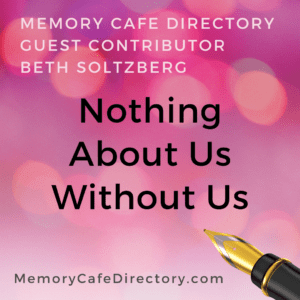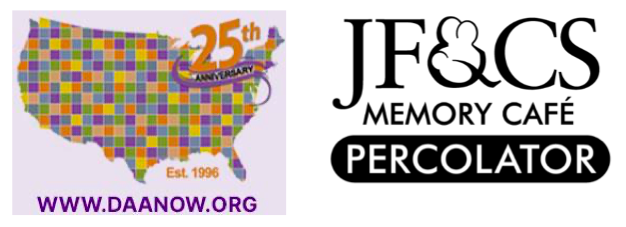Memory Cafe Directory posts and/or links to retailers can be advertising, sponsored, or affiliate links. We may earn a small commission from them. Thank you.
The phrase “nothing about us without us” dates back centuries, but disability rights activists gave it new life during the 1990s.
The disability rights movement has inspired advocates living with dementia, who remind providers that people living with dementia should help to guide and lead the programs that aim to serve them.
Empowerment and Meaningful Activity is Good Medicine!
For thirty years, Dementia Action Alliance (DAA) has focused on advocacy, education, empowerment and support by and for people living with dementia. The Jewish Family and Children’s Service (JF&CS) Memory Cafe Percolator is an open source network that helps organizations and individuals to start and sustain memory cafes.
Together, DAA and JF&CS Percolator recently released “A Memory Cafe Guide to Leadership and Other Meaningful Roles for People Living with Dementia.”
The guide takes on three central challenges:
1 First, memory cafes aim to be a welcoming place for participants who have not been diagnosed, or do not accept their diagnosis, as well as those who do.
For example, to meet this goal, many Memory Cafes have chosen their program’s name and the language in their promotional materials carefully.
2 Many have trained their volunteers and guest presenters to be cautious about raising the topic of dementia. Many have worked hard to create an environment where acknowleging dementia is totally optional.
Given this, how do we encourage participants living with dementia to take an active role in planning and leadership, while maintaining care not to surpass the level of frankness about dementia that some participants are ready for?
What’s more, most Memory Cafes have very small budgets and limited staff time. Working with volunteers in any circumstance requires an investment of time. How do we use our limited time to engage participants more as leaders, given that disease progression may limit the length of time that they can maintain these roles?
3 And finally, not all Memory Cafe participants want to be leaders or designers. Like any group of individuals, they vary in their interests and level of energy. Can we continue to meet the needs of those who are happy to enjoy a respite where the program is planned for them?
Yes!
The answer to these challenges is that YES, we can meet them. In fact, the Guide is based on the practices already in place by Memory Cafes around the US and beyond. It aligns perfectly with the belief: Nothing About Us Without Us!
It was shared with the Percolator through a survey in spring of 2021 and presented at the Percolator quarterly idea exchange on December 8, 2021. You can view the recording of this meeting here:
Guided by Principle
The way that we can respond to the diverse needs and interests of our participants is straightforward. We must be guided by the principle of meeting each participant where that individual is.
We can create more opportunities for expanded roles. For example, we can:
- Host occasional presentations by advocates about living well with dementia
- Offer opportunities for feedback, input and participation in Memory Cafe design and facilitation
- Create indiviudalized roles for participants
- Encourage interaction among participants
- Consider advocacy efforts beyond the Memory Cafe
Particular offerings may spark interest for particular participants. One size will not fit all – and that’s okay!
What’s on the Menu?
Sticking with the concept of a Memory Cafe, let’s think of this goal as expanding the list of offerings on our Memory Cafe’s “menu.” If we expand the menu of what’s available in this way, then each participant can pick what is right for them.
We hope this Guide will help Memory Cafe coordinators to do just this, at the pace that fits their own organizational capacity. (Click to graphic below to access the Guide.)
This Guide was developed with participation by the Percolator Dementia Inclusive Work Group, comprised of Mike Belleville, Michael White, Gail Sonnesso, and Beth Soltzberg. It is informed by a survey of Memory Cafe coordinators and a panel discussion held at the Percolator Idea Exchange on December 8, 2021.
During that event, many Memory Cafe coordinators provided insights and suggestions, including Beverley Cassidy, Emily Williams, Brian Connolly, Rob Griesel, Erika Campbell, and Shelly Roy.
We would love your feedback about the guide! Please email your feedback to Beth Soltzberg at bsoltzberg@jfcsboston.org.
About the Author
Beth Soltzberg
Beth Soltzberg, LICSW, MBA, directs the Alzheimer’s/Related Disorders Family Support Program at Jewish Family & Children’s Service in Waltham, Massachusetts. She facilitates the JF&CS Memory Cafe and a support group for adults whose parent lives with dementia.
Beth founded and coordinates the JF&CS Memory Cafe Percolator, an international resource for those starting and sustaining Memory Cafes. Beth leads Dementia Friends public awareness program for Massachusetts, and is part of the statewide leadership team promoting dementia friendly community initiatives.
Beth earned her MSW and MBA from the University of Chicago and a certificate in end-of-life care from the Smith College School of Social Work. She holds an advanced credential in hospice and palliative care social work (AHPC-SW).
Become a Contributor!
 Do you want to be a Memory Cafe Directory contributor? If you have helpful information to share with our community, read about the guidelines, then get in touch to discuss what you have to offer.
Do you want to be a Memory Cafe Directory contributor? If you have helpful information to share with our community, read about the guidelines, then get in touch to discuss what you have to offer.
Thank you.






